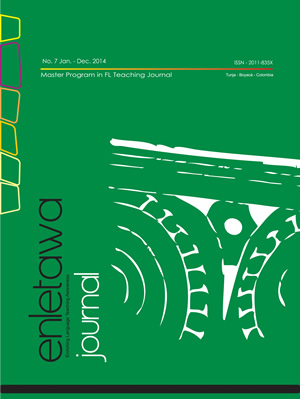Post Method Pedagogy as an Alternative to Autonomous and Well Oriented Teaching Practices

Resumen
This paper is a theoretical discussion focused on post method characteristics and parameters proposed by Kumaravadivelu (1994, 2001, 2003, 2006). Based on these considerations, the paper discusses some
advantages and shortcomings by applying the post method pedagogy. The reflective paper concludes that postmethod pedagogy is an interesting alternative to teach, but it implies a challenge for teachers since they
need to take responsibility of their own professional development and their role as reflective and active teachers
Citas
- Colombian Education Ministry (2006). Standards for Foreign Language Teaching, Bogota: National press.
- Bell, D (2007).Method and Postmethod:Are they Really So Incompatible. TESOL, Quarterly, 325-334.
- Brown, D (2002). Implementation of Life Cycle Impact Assessment Methods. TESOL Quarterly, 86-95.
- Can, N. (2011).Postmethod Pedagogy: TeacherGrowth BehindWalls. Hacettepe University. Enletawa Journal 157 Master Program in FL Teaching
- Cahit, B. (2009). A New Challenge in the Methodology of the Postmethod Era. Journal of Language and Linguistics, 5 (2), 1-6.
- Dewey, J. (1933). How we think. New York. Buffalo. NY: Prometheus Books (original work published in 1910).
- Eduard, C. (1998) Foster, “Cultural Assumptions and Values”.BasicConcepts of Intercultural Communication.
- Giroux, H, A. (1998). Schooling and the Struggle forPublic Life: Critical Pedagogy in theModernAge.Minniapolis: University of Minissota Press.
- Goodley, D. (2010). For Inclusion: Toward a Critical Pedagogy with Marginalized Learners. Manchester, Manchester Metropolitan University.Research Institute of Health and Social Change.
- Kumaravadivelu, B (1994). The Postmethod Condition: Emerging Strategies For Second/foreign Language Teaching. San José State, University of California, new york.
- Kumaravadivelu, B (2001). Toward a Postmethod Pedagogy. San Jose
- State,University of California, New York.
- Kumaravadivelu,B (2003).Beyondmethods: Macrostrategies for language Teaching. New Haven and London, Yale University Press.
- Kumaravadivelu, B (2006). Dangerous liason: Globalization. TESOL In an age of empire ( pp 1 27) , New York.
- Liu (1995). Comments on B. Kumaravadivelu’s “The postmethod
- Condition: Emerging Strategies for Second/Foreign Language Teaching.
- TESOL Quarterly.
- Norton, B. (2000). Identity and Language Learning. London: Longman.
- Norton, B., and Toohey, K. (2001).Identity, language learning, and social change. TESOL Quarterly, 44- 62.
- Norton, B., and Toohey, K. (2004).Critical Pedagogies and Language Learning.
- Prabhu, N, S. (1990). There is not Best Method. TESOL Quarterly, 162-174.
- Richards, J., and Rodgers, T (2001). Approaches and Methods in Language Teaching.
Descargas
Los datos de descargas todavía no están disponibles.